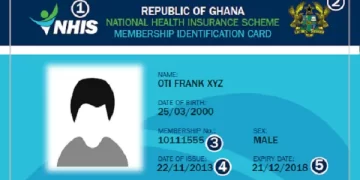The National Service Scheme (NSS) has commenced the implementation of a new system to offer more service personnel with skills and hands-on entrepreneurial training to make them ready for the job market or establish their own companies after one year.
The initiative, which is a significant boost to the government’s employment generation agenda, also includes the creation of an electronic job platform to absorb all completed individuals and suitably match their skill sets with enterprises in need of their services.
Mr Osei Assibey Antwi, Executive Director of the National Service Scheme, disclosed this during a stakeholder meeting in Accra, and said that the scheme is now coordinating with several user agencies to ensure that most of the persons who excel are engaged after the service period.
The meeting, which drew over 300 principals and registrars from both public and private tertiary educational institutions, was themed “Strengthening the GNAA Database Through Digitalization for Efficient Deployment.”
Mr. Osei Assibey said that the deployment campaign was part of the organization’s new vision of not just deploying personnel but also ensuring that they become self-employed, give employment to others, and are ready for employment under the larger plan of “Deployment for Employment.”
Already, the program is working with several higher institutions and business organizations, which has resulted in the creation of numerous models such as estate development, computer applications, and software development, among others.
Pathways to Sustainable Employment (PaSE) Project Ghana Tech Lab (GTL), which is currently training a large number of service personnel in mobile app and website building skills; Venture Building Program, which is grooming Service Personnel with entrepreneurship skills throughout the service year; and GNSS are some models for training and employment.
The Ghana Export Promotion Authority also provides entrepreneurship and other skills required to create products and services that can be exported outside Ghana; the GNSS/Ghana Enterprises Agency for the training of personnel in entrepreneurship and the provision of support in various business fields throughout the country; and the Stanbic Graduate Transition Support Program (GTSP), which is currently providing a sustainable financial support system for National Service Personnel in the country.
Others include the NSS-GTA Support Program, which has currently deployed 677 personnel to support the development of tourism in the country; the Youth in Greenhouse Enterprise Project, which is training National service personnel in the agri-business field; and the NSS Construction and Housing Project, which is training personnel to embark on real estate housing construction.
Mr. Osei Assibey said that, although the program did not deviate from Act 426 (1980), it was decided to be unique in satisfying the socioeconomic demands of Ghanaian graduates.
“Over the years, we have traditionally deployed personnel for their national service after which many of them are left without meaningful employment”, he said and added that to close this gap management has engaged the services of a consultant to draft a policy document.
He stated that over the course of the year, tertiary institutions submitted their class lists on pen drives, emails, and hand copy, which was vulnerable to manipulation, increased the potential for errors due to multiple desktop processing, delayed processing due to time spent correcting mistakes, and caused stress to the graduates.
He stated that the new NSS digitalized class list submission system provides a secure interactive platform for institutions and the national service to provide secure and real-time data in a seamless, fast, and effective manner.
The NSS Board Chairman, Nee Odoi Tetteyfio, advocated for better engagement with stakeholders, particularly tertiary institutions, to ensure the scheme’s new direction of providing an e-platform for information collection was effective.
This, he noted, would also assist in the supply of entrepreneurship and skill sets to guarantee that the personnel become the country’s future affluent and job creators.
Prof Mohammed Salifu, Director-General of the Ghana Tertiary Education Commission, praised NSS management and said the new mechanism for submitting class lists offered a great resource for policymakers and the business sector to depend on in their decision-making process.
In reference to the “Deployment for Employment” policy, he said that it represented a complete shift in mentality and paradigm shift for NSS.
He outlined the four-step process, which includes creation, which focuses on partnerships, deployment, which includes tools to support the partnerships and the database, and training, which includes a support system for the trainees in terms of entrepreneurship, incubation, prototype development, and preparing them for the world of work.
Prof Salifu stated that the Flair system, which is included in the new system, is a match-making website for prospective employers to meet employees with the necessary skill set, and that there could not be a better platform like this because it would address the labor market’s needs with its one-stop-shop.
He appreciated the NSS’s assurance that the registrar training would be reproduced at the different regional levels and that they would be directly engaged so that management of the various tertiary institutions would be able to give the needed data.
Read Also: UTAG agrees to call off strike – Education Committee
SOURCE: CITINEWS


























